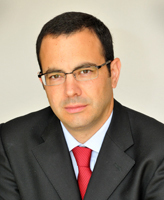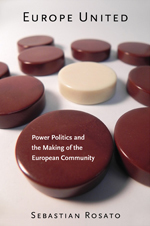
In his new book, Europe United: Power Politics and the Making of the European Community, University of Notre Dame Assistant Professor Sebastian Rosato warns of a troubled future for the European Union (EU).
“The Europeans failed to build a military to challenge the United States, despite lofty rhetoric to the contrary,” says Rosato. “They failed to pass a constitution. And they have been slowly eviscerating the single market and single currency.”
“Simply put,” he says, “the European Community’s best days are long gone—and there is worse to come.”
Fraternity or Fear?
Recently released by Cornell University Press, Rosato’s book challenges supporters’ idealistic view that the EU was formed out of a collective and border-transcending sense of European fraternity.
While Europeans believe they have “left behind power politics,” says Rosato, the real reason behind pan-European cooperation was the cold-war menace posed by Europe’s once-powerful neighbor, the Soviet Union. Now, without that same threat, European nations are beginning to heed internal political pressure to look after their own interests and will gradually turn away from the EU bureaucracy.
“My argument is that the threat to Europe’s security disappeared in 1991 with the dissolution of the Soviet Union,” Rosato says. “It was terrifying during the Cold War when the Soviet Union held thousands of nuclear weapons at the doorstep of Europe,” he says. “The Soviets were very close, very big—and they were Communists committed to world revolution.”
Today, he says, Russia is not much more powerful than France; and if Russia posed a threat in the future, “Europe could deal with it without forming a community.”

The Dream of Unity
Years of hopeful rhetoric about a united Europe began in 1951 with the establishment of the European Coal and Steel Community, Rosato says, but the dreams of greater unity don’t match the reality when it comes to military and political union.
Signs even abound that the single currency, the euro, is under threat from growing nationalism among the strongest EU member nations. During the recent European financial crisis, for example, Rosato cites reports that French officials threatened to walk away from the euro while involved in contentious discussions of Greece’s aid package.
As Germany, the driving economy of Europe, is increasingly asked to bail out ailing national economies in southern Europe, its leaders’ “patience could reach a breaking point,” Rosato says. “They bailed the Greeks out, but Greece is small. If Italy or Spain fails, Germany could well pull out.”
Another threat to the EU’s solidarity is that France or Germany, the strongest member states, could attempt to exercise more control over the powerful European Central Bank, Rosato says.
“At that point, you may have something called the European Union,” he says, “but if you have powerful independent governments running the show, it is a union in name only.”
An International Impact
The unraveling of the EU might pose challenges for the United States if the country’s leaders continue to view themselves as the world’s economic and military police, Rosato says.
“You can’t run the planet on your own,” he says, “and a lot more diplomacy would be required if your most important partner is no longer a viable entity.”
Indeed, armed with a warning of the EU’s potential decline, all of Europe’s allies should plan contingencies, says Rosato. “I’m not rooting for the demise of the European Union, but there’s evidence it’s happening already.”
Rosato, who joined the Notre Dame faculty in 2006, specializes in international relations theory and international security. He is an assistant professor of political science, director of the University’s International Security Program, and a faculty fellow at the Nanovic Institute for European Studies and the Joan B. Kroc Institute for International Peace Studies. He did his undergraduate work at Cambridge University and received graduate degrees from Oxford University and the University of Chicago.


